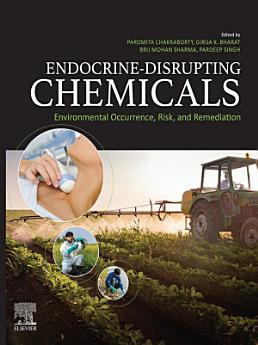Endocrine-Disrupting Chemicals: Environmental Occurrence, Risk, and Remediation
អំពីសៀវភៅអេឡិចត្រូនិកនេះ
អំពីអ្នកនិពន្ធ
Dr. Paromita Chakraborty is Professor and Head at Centre for Research in Environment, Sustainability Advocacy and Climate Change (REACH) in SRM Institute of Science and Technology, Kattankulathur, India. Dr.Chakraborty leads the Environmental Science and Technology research group, and her group is intensively working on fate, transport and cost-effective remediation techniques for legacy and emerging organic contaminants including endocrine disruptors. Dr.Chakraborty is the principal investigator for projects funded by national funding agencies like DST, MoEFCC, and international funding agencies like Indo-US Science and Technology Forum, Research Council of Norway, Norwegian Embassy and Swiss Development Cooperation. She has published 100+ scientific articles in peer reviewed international journals including Water Research, Environmental Science and Technology etc. She has edited 4 books and 25+ book chapters mostly in Springer and Elsevier publishing houses. She is an associate editor for the “Science of Total Environment and the Arabian Journal of Geosciences.
Dr. Girija K Bharat is the Managing Director of Mu Gamma Consultants, Gurugram, India. She is an international expert with three decades of experience in Water Resource Management and Environmental Management. She conducts research, capacity building and advocacies on contaminants of emerging concerns such as Persistent Organic Pollutants (POPs), Endocrine Disrupting Chemicals (EDCs), microplastics etc. She advises several Government of India ministries on water and environmental issues. She has over 120 publications that include scientific articles in peer reviewed international journals, book chapters, international reports, and newspaper articles.
Currently serving as a Marie Curie Postdoc (Global) Fellow at RECETOX, Masaryk University in the Czech Republic, and at ETH Zurich in Switzerland, Dr Brij Mohan Sharma is an interdisciplinary researcher with robust expertise in chemical pollution management, natural resources management, sustainable development, and human biomonitoring, including health risk assessment of toxic chemicals. He has effectively led collaborative projects on a global scale, yielding numerous impactful peer-reviewed publications in high-impact international journals. Driven by a passion for advocating sustainable development goals and environmental management reforms, he actively presents and addresses chemical pollution issues, especially in developing countries, at various international forums. Dr Sharma is strongly motivated to engage with both academic and non-academic institutions, aiming to contribute to the establishment of a sustainable and prosperous society.
Dr. Pardeep Singh is an Assistant Professor at the Department of Environmental Science, PGDAV College, University of Delhi, in New Delhi, India. He obtained his PhD at the Indian Institute of Technology (Banaras Hindu University) Varanasi. Dr. Singh has published more than 65 papers in international journals in the fields of waste management, environmental pollution, and agricultural nanotechnology, and has co-edited 30 books.





